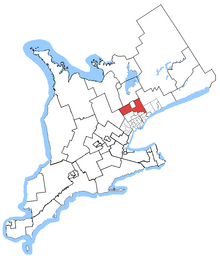Oak Ridges—Markham
|
|
|
|---|---|

Oak Ridges—Markham is in south-central Ontario, just north of Toronto
|
|
| Coordinates: |
43°55′45″N 79°31′37″W / 43.92917°N 79.52694°WCoordinates: 43°55′45″N 79°31′37″W / 43.92917°N 79.52694°W Location of the federal district constituency office in King City (as of 26 August 2010[update]) |
| Defunct federal electoral district | |
| Legislature | House of Commons |
| District created | 2003 |
| District abolished | 2013 |
| First contested | 2004 |
| Last contested | 2011 |
| District webpage | profile, map |
| Demographics | |
| Population (2011) | 228,997 |
| Electors (2011) | 151,584 |
| Area (km²) | 679.90 |
| Census divisions | York |
| Census subdivisions | Markham, Richmond Hill, Whitchurch–Stouffville, King |
Oak Ridges—Markham was a federal electoral district in Ontario, Canada, that was represented in the Canadian House of Commons from 2004 to 2015. Its population in 2006 was 169,645., with 136,755 electors, the highest of any riding in Canada. By 2011, the riding's population had risen to 228,997, the largest population of all ridings in Canada.
The district covered part of the suburbs north of Toronto. It included the town of Whitchurch–Stouffville, most of the township of King (excepting extreme northeast) the northern portions of the town of Richmond Hill (including all of Oak Ridges), and the northern and eastern portions of the city of Markham.
The electoral district was created in 2004 52.5% from Oak Ridges, 30% from Markham, 13% from Vaughan—King—Aurora, and 4.5% from York North riding.
Following the 2012 federal electoral boundaries redistribution, the district was split between King—Vaughan, Aurora—Oak Ridges—Richmond Hill, Markham—Unionville, and Markham—Stouffville.
Communities in Oak Ridges—Markham are the destination for many immigrants to Canada, composing about 41.6% of the population, or about 70,000 of its residents. For 72,440 residents, neither English nor French, the official languages of Canada, is their mother tongue, though most have knowledge of English (148,975), French (160), or both (12,885). Most immigrants become citizens, as 11,155 immigrants were not Canadian citizens as of the Canada 2006 Census.
...
Wikipedia
